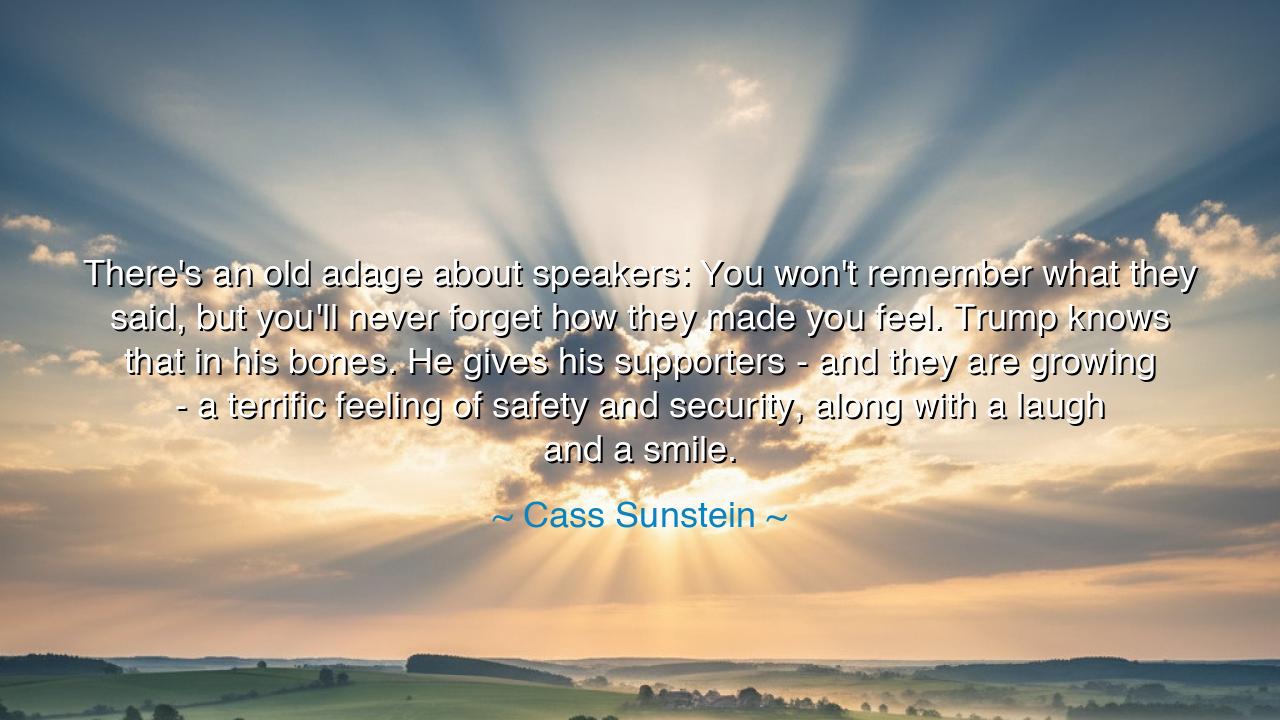
There's an old adage about speakers: You won't remember what they
There's an old adage about speakers: You won't remember what they said, but you'll never forget how they made you feel. Trump knows that in his bones. He gives his supporters - and they are growing - a terrific feeling of safety and security, along with a laugh and a smile.






Hear the words of Cass Sunstein, scholar and observer of power, who draws from ancient wisdom to describe the force of persuasion: “There's an old adage about speakers: You won't remember what they said, but you'll never forget how they made you feel. Trump knows that in his bones. He gives his supporters—and they are growing—a terrific feeling of safety and security, along with a laugh and a smile.” This truth, though clothed in the politics of our age, stretches back through centuries, for it speaks not of one man alone but of the timeless bond between speaker and audience, between word and feeling, between memory and emotion.
The meaning of this truth begins with the recognition that words, though they pass quickly, leave behind something far greater: the feeling they stir within. One may forget the details of a speech, the precise sentences uttered, but the spirit awakened—whether joy, trust, anger, or hope—lingers in the soul. Sunstein recalls this ancient adage to show that rhetoric is less about knowledge than about emotion. The smile, the sense of safety, the laughter shared—these are the true weapons of persuasion, sharper than logic, more enduring than reason.
History abounds with examples. Consider the speeches of Pericles in ancient Athens. Few citizens could repeat his words verbatim after he spoke, but all remembered how he made them feel—proud of their city, willing to sacrifice, ready to endure hardship. Or think of Martin Luther King Jr., whose words are quoted still, but whose true power lay not in syllables alone, but in the profound hope and dignity they awakened in hearts. The greatest orators do not merely instruct; they transform feeling into memory, and memory into action.
Sunstein observes that Trump understands this instinctively, “in his bones.” Whatever one may think of his policies or his words, his skill lies in this: the ability to wrap his audience in a sense of belonging, to make them laugh, to offer the illusion—or the reality—of safety and security. This is the heritage of every populist leader, from Caesar rallying his legions to Roosevelt addressing a fearful America during the Great Depression. The lesson is not confined to politics: in every sphere of life, those who master emotion master allegiance.
Yet, there is a danger here as well. For if people are swayed not by what is said but by how they feel, then truth itself may be eclipsed by performance. A silver tongue can cloak deception, a smile can mask ambition, and the warm cloak of belonging can be used to lead astray. History’s tyrants, no less than its heroes, understood the same principle. Hitler’s speeches, though filled with falsehoods, made his followers feel powerful and unified. Thus, the teaching is double-edged: the gift of stirring emotions is a sacred trust, one that may heal or destroy depending on the soul of the speaker.
The lesson for us is clear. Guard your heart when listening, for it is easier to be swayed by feeling than by reason. At the same time, if you would speak to others, do not rely only on facts and arguments, but learn to touch their hearts. A leader, a teacher, a parent, or a friend—all must remember that people will not cling to your words, but to the emotion you left with them. Use this knowledge not for manipulation, but for inspiration, for the building of trust, for the creation of hope.
Therefore, let each one act thus: speak with honesty, but also with warmth; give others not only knowledge, but a feeling of safety and joy; and smile when you lead, for a smile can disarm the weary and strengthen the fainthearted. But also, when listening, seek the truth beneath the feeling, lest you be swayed by charm alone.
Thus, the teaching is eternal: Words may fade, but the smile remembered, the hope kindled, the security felt—these endure. The wise speaker uses them to uplift; the unwise may use them to deceive. And so we must learn both to stir the hearts of others and to guard our own.






AAdministratorAdministrator
Welcome, honored guests. Please leave a comment, we will respond soon